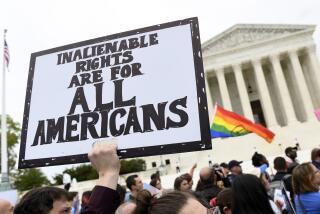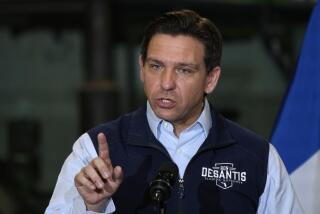Student Peer Counselors Learn to Listen
- Share via
It is only a one-unit class that cannot be used for college credit, but students in peer counseling at Paramount High School say the course is more difficult than their academic subjects.
But students say they enjoy the class because they are helping other teen-agers.
“It is emotionally challenging,” said Jill Zuidervaart, 17, a senior peer counselor.
Another counselor, 17-year-old junior Tracy Dawson said: “This is harder than math.”
Shelly Massicotte, 17, an advanced counselor added: “We are dealing with real-life stuff.”
After completing a 20-week semester of classroom training, students during the second semester provide counseling to their peers. Of the 36 students now attending peer counseling classes, eight have advanced to the point where they can handle any type of problem.
Troubled teen-agers place their request slips for counseling in a locked wooden box in the library. Peer counseling teacher Sandy Jacobs is the only one with a key to the box.
Problems range from drugs to pregnancy, rape, suicidal thoughts and alcoholic and abusive parents.
Other students who might be suspected of taking drugs or are having academic problems and are unwilling to talk with adult counselors or teachers are referred to the peer counselors.
The peer counselors “help break the ice. They move the student to seek resources on campus,” said Michael White, who heads the school student counseling services.
The youths talk with the peer counselors in empty rooms, during lunch hours or after school. Sometimes the youth counselors might be dismissed from one of their regular classes to talk with a troubled classmate.
The peer counselors listen, but they do not try to tell troubled students what to do. Everything they talk about is kept in strict confidence. However, they are required by state law to report cases of abuse or possible suicide or potential harm or threats to others.
In the case of a 17-year-old male student who was sleeping with a gun under his pillow, peer counselor Olivier Contreras said she listened and was able to get the young man to talk about his problems. He was considering killing himself because of problems he was having with his girlfriend.
“He was nervous. I held his hand,” Contreras said.
The young man’s parents were told, school authorities were notified and professional counseling was recommended for him, Jacobs said. The youth has since dropped out of school.
Girls who think they are pregnant are informed about their options, which include talking with their parents, seeking professional counseling and discussing the situation with the baby’s father. They are also encouraged to seek a medical examination immediately.
The peer counseling program was started as an after-school pilot project three years ago by Jacobs, who was a business teacher at the school. She is also the substance abuse coordinator. Jacobs has a BA and MA in business. She also has an MA in counseling psychology and is a licensed marriage, family and child therapist.
Jacobs said she was hearing so many student problems that she thought it might be a good idea to start a peer counseling group.
Many public schools have found peer counseling to be successful in dealing with student problems, said Michael Donnelly, president of the California Peer Counseling Assn. The association is a statewide volunteer organization composed of adult professionals counselors and student peer counselors.
According to the most recent data based on a 1986 state Department of Education survey, 25% of more than 800 high schools had some type of peer counseling program, Donnelly said.
“Good counseling programs work when students (counselors) are properly trained,” said Donnelly, who runs a peer counseling program at San Gabriel High School.
The Paramount Unified School District Board of Education approved the class for the one-unit elective credit last year and Jacobs began teaching it full-time.
The students who sign up must have passing grades and be recommended by their teachers. The peer counselors are taught basic skills on how to be good listeners and how to communicate to troubled youths that they can seek alternatives to their problems.
Jacobs said of the peer counselors: “While they may never use algebra in their adult lives,” they will always be able to use their counseling skills.
More to Read
Sign up for Essential California
The most important California stories and recommendations in your inbox every morning.
You may occasionally receive promotional content from the Los Angeles Times.













